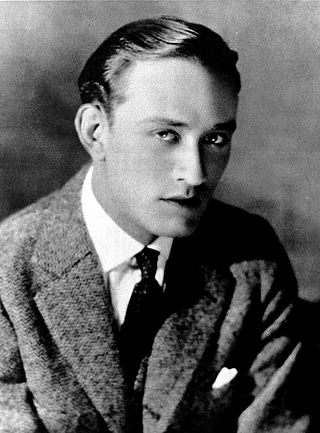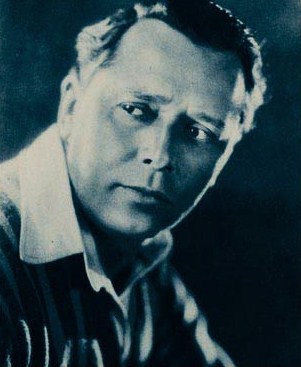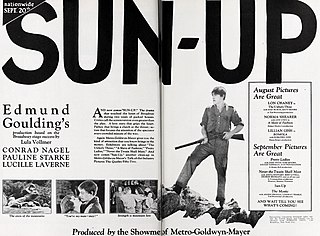
John Conrad Nagel was an American film, stage, television and radio actor. He was considered a famous matinée idol and leading man of the 1920s and 1930s. He was given an Honorary Academy Award in 1940, and three stars on the Hollywood Walk of Fame in 1960.

Julia Faye Maloney, known professionally as Julia Faye, was an American actress of silent and sound films. She was known for her appearances in more than 30 Cecil B. DeMille productions. Her various roles ranged from maids and ingénues to vamps and queens.

Theodore Kosloff was a Russian-born ballet dancer, choreographer, and film and stage actor. He was occasionally credited as Theodor Kosloff.

The Volga Boatman is a 1926 American silent drama film directed by Cecil B. DeMille, who reportedly said the film was, "his greatest achievement in picture making". The film's budget was $479,000 and it grossed $1.27 million. The film was highly successful, turning William Boyd into matinee idol overnight.

The Law of the Lawless is a lost 1923 American silent drama film directed by Victor Fleming.

The Golden Chance is a 1915 American silent drama film directed by Cecil B. DeMille. Art direction for the film was done by Wilfred Buckland. DeMille remade the film in 1921 as Forbidden Fruit.

The Little American is a 1917 American silent romantic war drama film directed by Cecil B. DeMille. The film stars Mary Pickford as an American woman who is in love with both a German soldier and a French soldier during World War I. Art direction for the film was done by Wilfred Buckland. John Hay Beith was technical advisor on the film, credited under his pen name, Ian Hay.

The Woman God Forgot is a 1917 American silent romance film directed by Cecil B. DeMille and starring Geraldine Farrar. Art direction for the film was done by Wilfred Buckland.

Don't Change Your Husband is a 1919 American silent comedy film directed by Cecil B. DeMille and starring Gloria Swanson. The film was the third of six "marriage films" directed by DeMille and the first DeMille film starring Gloria Swanson. A Chinese silent film, Don't Change Your Husband (1929), used the same English title, and a similar plot arc.

Something to Think About is a 1920 American silent drama film directed by Cecil B. DeMille. The film stars Elliott Dexter and Gloria Swanson.

Forbidden Fruit is a 1921 American silent drama film directed by Cecil B. DeMille, and starring Agnes Ayres, Forrest Stanley, Clarence Burton, and Kathlyn Williams. It is a remake of the 1915 film The Golden Chance, which was also directed by DeMille.

Saturday Night is a 1922 American silent romantic comedy film directed by Cecil B. DeMille and starring Leatrice Joy, Conrad Nagel, and Edith Roberts. It was Leatrice Joy's first film with DeMille.

Triumph is a 1924 American silent drama film directed by Cecil B. DeMille and starring Leatrice Joy and Rod La Rocque. It was based on a 1924 novel of the same name by May Edginton. The novel had previously been serialized in 1923 by The Saturday Evening Post.

The Road to Yesterday is a 1925 American silent romantic drama film directed by Cecil B. DeMille. The film was based on a 1908 play of the same name by Beulah Marie Dix and Evelyn Greenleaf Sutherland and was adapted by Dix and Jeanie MacPherson. Art direction for the film was done by Paul Iribe, Anton Grot, Mitchell Leisen, and Max Parker.

Lights of Old Broadway is a 1925 American silent drama film directed by Monta Bell, produced by William Randolph Hearst's Cosmopolitan Productions, and released by Metro-Goldwyn-Mayer. The film stars Marion Davies in a dual role and Conrad Nagel, and is an adaptation of the play The Merry Wives of Gotham by Laurence Eyre (USA). The film has color sequences using tinting, Technicolor, and the Handschiegl color process.

Sun-Up is a 1925 American silent drama film directed by Edmund Goulding based upon a successful 1924 play of the same name by Lula Vollmer. The film stars Lucille La Verne, replaying her successful New York stage role, Pauline Starke, and Conrad Nagel.

Grumpy is a 1923 American silent comedy drama film distributed by Paramount Pictures. It is based on a 1913 Broadway play Grumpy by Horace Hodges and Thomas Wigney Percyval and starred English actor Cyril Maude. The director of this film is William C. deMille, brother of Cecil, and the star is Theodore Roberts. This film was remade by Paramount as an early sound film for Cyril Maude reprising his Broadway role.

The Coming of Amos is a 1925 American silent romantic drama film directed by Paul Sloane, produced by Cecil B. DeMille and distributed by his Producers Distributing Corporation. Copies of this film survive and can be found on home video and more recently on DVD.

Midsummer Madness is a 1921 American silent drama film produced by Famous Players–Lasky and released by Paramount Pictures. It is based on the novel His Friend and His Wife by Cosmo Hamilton.

The Tree of Knowledge is a lost 1920 American silent drama film produced by Famous Players–Lasky and distributed by Paramount Pictures. It was directed by William C. deMille and starred Robert Warwick. It is based on an 1897 play, The Tree of Knowledge, by R. C. Carton.





















